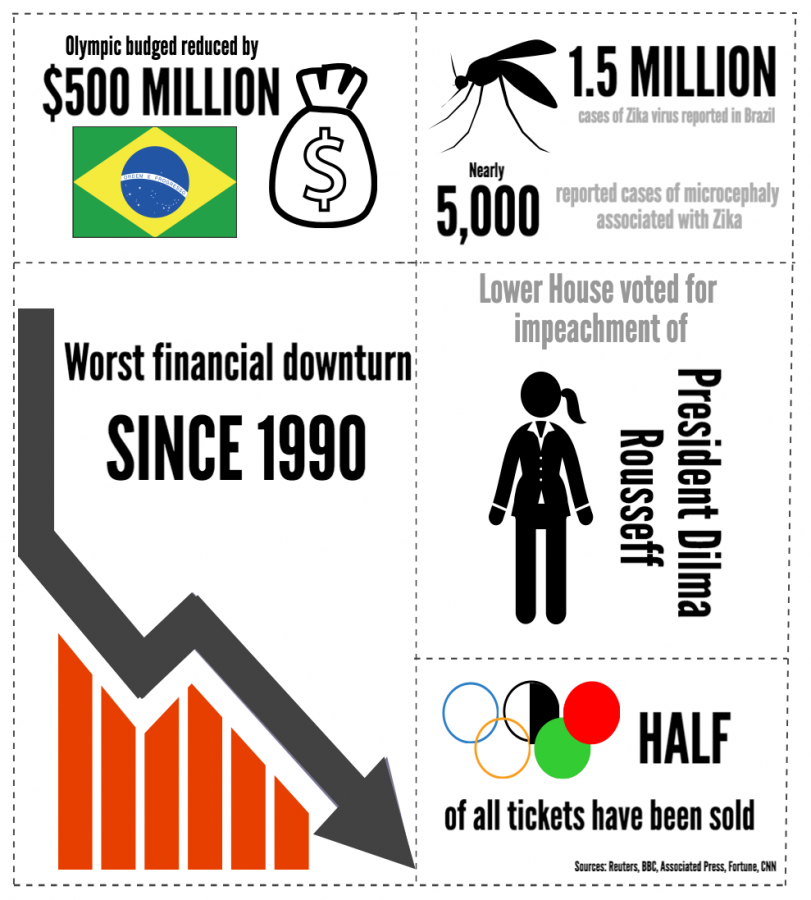Rio Olympics’ attendance hurt by Zika virus, political unrest
May 5, 2016
The spread of the Zika virus, a financial downturn, pollution issues and the recent vote to impeach President Dilma Rousseff in Brazil have raised significant concerns regarding preparations for the 31st Olympic Games, which Rio de Janeiro will host from Aug. 5 to 21.
“The International Olympic Committee (IOC) is closely monitoring the situation with Zika in Brazil,” the IOC Medical and Scientific Commission said in an official statement. “We are also in close communication with the WHO [World Health Organization] and the Rio 2016 Organising Committee on this topic… We remain confident that there will be a safe environment for successful and enjoyable Olympic Games in Rio de Janeiro.”
The Zika outbreak began in Brazil in April 2015, and the virus can be transmitted through mosquito bites or sexual contact. Although Zika does not cause significant symptoms in most cases, researchers are investigating possible connections between Zika and microcephaly, a condition in which babies are born with heads unusually small heads, according to the World Health Organization.
“Aedes aegypti [mosquitoes] are the most common vector for transmitting Zika, and they do tend to breed in small little puddles and pools of water in urban environments like flower pot trays and tires and things like this,” said Dr. Paul Roepe, Professor in the Department of Chemistry and the Department of Biochemistry and Cellular & Molecular Biology at Georgetown University, and co-director of Georgetown’s Center for Infectious Diseases.
The Center for Disease Control (CDC) has issued travel alerts and precautions for those traveling to countries with Zika virus outbreaks, including Brazil. The CDC has specifically recommended that pregnant women not travel to the Rio Olympics unless absolutely necessary.
However, the U.S. Olympic Committee (USOC) will neither prevent any athletes from participating in the event nor recommend staying away from the event.
“Team USA looks forward to the Games and we did not, would not and will not prevent athletes from competing for their country should they qualify,” Patrick Sandusky, United States Olympic Committee (USOC) spokesperson said in a public statement, in response to affirmations that the USOC has advised athletes against attending.
Another concern for the Olympics in Rio is the state of the venues for water events.
“A feature of Rio’s plans is the cleaning and regeneration of Rio’s waterways and lakes through government projects for major new water treatment and sewerage works and education campaigns,” the Rio 2016 Committee said in its official proposal bid in 2009.
However, according to water quality tests conducted by the Associated Press in 2015, Rio’s future Olympic waterways contain virus levels high enough that experts have expressed concerns over potential health repercussions for athletes.
In addition to health concerns, Brazil is currently experiencing its worst financial downturn since 1990, a stark contrast to the state of its economy in 2009, when the International Olympic Committee (IOC) selected Rio as host of the 2016 games. The Rio Olympic Organising Committee has cut their budget by approximately $500 million, although no cuts have been made to venues or athlete accommodations, according to the Associated Press.
As of our publication date, Brazil has sold less than half of tickets available for all events, according to Fortune.
“About 90% of all [Brazil] make[s] from tourism is from domestic tourism,” said Dr. Carolin Lusby, Assistant Professor at Florida International University in The Chaplin School of Hospitality and Tourism Management. “In that regard, international tourism has an impact on the economy, but most of their money comes from interstate visitors.”
Specifically, in 2014, domestic tourism spending comprised 95 percent of total tourism spending, according to the World Travel and Tourism Council.
The Opening Ceremony is sold out, according to Fortune, and will mark the beginning of the games at the Maracanã Stadium on Aug. 5.
This piece was originally published in the pages of the Winged Post on May 4, 2016.


















![“[Building nerf blasters] became this outlet of creativity for me that hasn't been matched by anything else. The process [of] making a build complete to your desire is such a painstakingly difficult process, but I've had to learn from [the skills needed from] soldering to proper painting. There's so many different options for everything, if you think about it, it exists. The best part is [that] if it doesn't exist, you can build it yourself," Ishaan Parate said.](https://harkeraquila.com/wp-content/uploads/2022/08/DSC_8149-900x604.jpg)




![“When I came into high school, I was ready to be a follower. But DECA was a game changer for me. It helped me overcome my fear of public speaking, and it's played such a major role in who I've become today. To be able to successfully lead a chapter of 150 students, an officer team and be one of the upperclassmen I once really admired is something I'm [really] proud of,” Anvitha Tummala ('21) said.](https://harkeraquila.com/wp-content/uploads/2021/07/Screen-Shot-2021-07-25-at-9.50.05-AM-900x594.png)







![“I think getting up in the morning and having a sense of purpose [is exciting]. I think without a certain amount of drive, life is kind of obsolete and mundane, and I think having that every single day is what makes each day unique and kind of makes life exciting,” Neymika Jain (12) said.](https://harkeraquila.com/wp-content/uploads/2017/06/Screen-Shot-2017-06-03-at-4.54.16-PM.png)








![“My slogan is ‘slow feet, don’t eat, and I’m hungry.’ You need to run fast to get where you are–you aren't going to get those championships if you aren't fast,” Angel Cervantes (12) said. “I want to do well in school on my tests and in track and win championships for my team. I live by that, [and] I can do that anywhere: in the classroom or on the field.”](https://harkeraquila.com/wp-content/uploads/2018/06/DSC5146-900x601.jpg)
![“[Volleyball has] taught me how to fall correctly, and another thing it taught is that you don’t have to be the best at something to be good at it. If you just hit the ball in a smart way, then it still scores points and you’re good at it. You could be a background player and still make a much bigger impact on the team than you would think,” Anya Gert (’20) said.](https://harkeraquila.com/wp-content/uploads/2020/06/AnnaGert_JinTuan_HoHPhotoEdited-600x900.jpeg)

![“I'm not nearly there yet, but [my confidence has] definitely been getting better since I was pretty shy and timid coming into Harker my freshman year. I know that there's a lot of people that are really confident in what they do, and I really admire them. Everyone's so driven and that has really pushed me to kind of try to find my own place in high school and be more confident,” Alyssa Huang (’20) said.](https://harkeraquila.com/wp-content/uploads/2020/06/AlyssaHuang_EmilyChen_HoHPhoto-900x749.jpeg)











